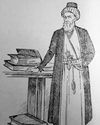Prøve GULL - Gratis
Philip Pettit & The Birth of Ethics
Philosophy Now
|February/March 2024
Peter Stone thinks about a thought experiment about how ethics evolved.

Philip Pettit is perhaps the most important Irish moral and political philosopher alive today. Born in Ballygar, County Galway in 1945, Pettit studied at Maynooth College, the National University of Ireland, and Queen’s University, Belfast. He began his teaching career at University College Dublin in 1968, and held numerous other teaching positions before arriving at Princeton University, where he is currently Laurance S. Rockefeller University Professor of Human Values. He also serves as Distinguished University Professor of Philosophy at Australian National University. Despite working in the United States and Australia, Pettit maintains ties to his native land, delivering, for instance, the inaugural Edmund Burke Lecture at Trinity College Dublin in 2007, and participating in President Michael D. Higgins’ Ethics Initiative in 2014.
Pettit has written numerous books on a variety of topics. He has, for example, for some time been an ardent advocate of republicanism. Long viewed as an alternative to liberalism, this political ideology (no relation to any political party) places nondomination at its core. According to republicans, a free society protects all its citizens, even (or especially) the most vulnerable, from subjection to the arbitrary whims of others. Pettit is also a strong proponent of group agency – the philosophical position that corporate bodies such as states or corporations can legitimately be regarded as agents in their own right, with agendas, beliefs, and preferences of their own. Only the existence of group agency, Pettit holds, can make sense of the way groups are able to function coherently over time despite the many differences among the individuals comprising them.
Pettit developed his book
Denne historien er fra February/March 2024-utgaven av Philosophy Now.
Abonner på Magzter GOLD for å få tilgang til tusenvis av kuraterte premiumhistorier og over 9000 magasiner og aviser.
Allerede abonnent? Logg på
FLERE HISTORIER FRA Philosophy Now

Philosophy Now
Bilbo Theorizes About Wellbeing
Eric Comerford overhears Bilbo and Gandalf discussing happiness.
9 mins
December 2025 / January 2026

Philosophy Now
What Women?
Marcia Yudkin remembers almost choking at Cornell
11 mins
December 2025 / January 2026

Philosophy Now
Islamic Philosophers On Tyranny
Amir Ali Maleki looks at tyranny from an Islamic perspective.
4 mins
December 2025 / January 2026

Philosophy Now
Peter Singer
The controversial Australian philosopher defends the right to choose to die on utilitarian grounds
5 mins
December 2025 / January 2026

Philosophy Now
Another Conversation with Martin Heidegger?
Raymond Tallis talks about communication problems.
7 mins
December 2025 / January 2026

Philosophy Now
Letters
When inspiration strikes, don't bottle it up. Email me at rick.lewis@philosophynow.org Keep them short and keep them coming!
17 mins
December 2025 / January 2026

Philosophy Now
The Philosophy of William Blake
Mark Vernon looks at the imaginative thinking of an imaginative artist.
9 mins
December 2025 / January 2026

Philosophy Now
Philosophical Haiku
Peering through life’s lens God in nature is deduced: The joy of being.
1 mins
December 2025 / January 2026

Philosophy Now
Philosophy Shorts
More songs about Buildings and Food' was the title of a 1978 album by the rock band Talking Heads. It was about all the things rock stars normally don't sing about. Pop songs are usually about variations on the theme of love; tracks like Rose Royce's 1976 hit 'Car Wash' are the exception. Philosophers, likewise, tend to have a narrow focus on epistemology, metaphysics and trifles like the meaning of life. But occasionally great minds stray from their turf and write about other matters, for example buildings (Martin Heidegger), food (Hobbes), tomato juice (Robert Nozick), and the weather (Lucretius and Aristotle). This series of Shorts is about these unfamiliar themes; about the things philosophers also write about.
2 mins
December 2025 / January 2026

Philosophy Now
Hedonic Treadmills in the Vale of Tears
Michael Gracey looks at how philosophers have pursued happiness.
8 mins
December 2025 / January 2026
Listen
Translate
Change font size
